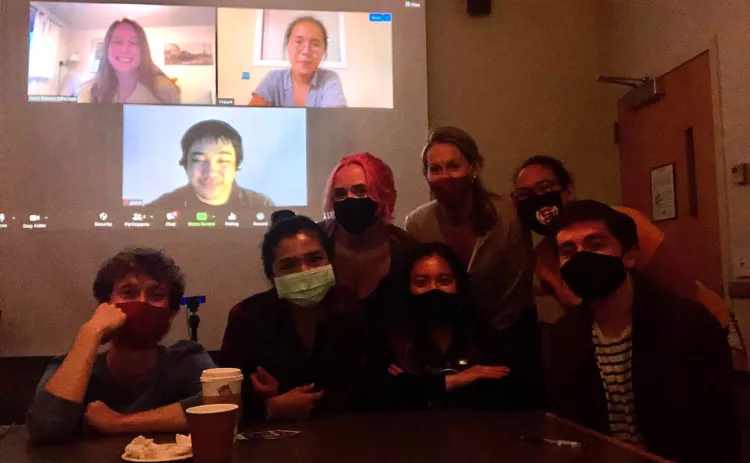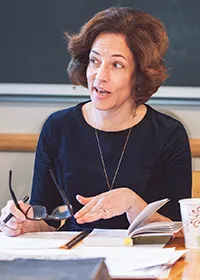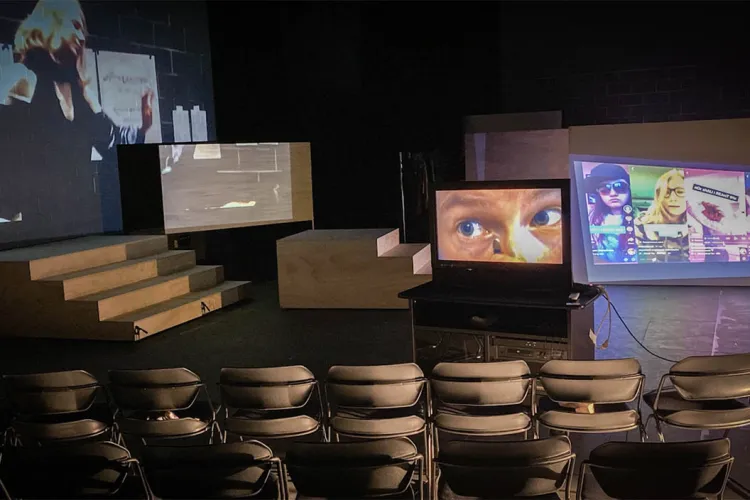Honors Program Adapts and Thrives in Virtual Environment

Assistant Professor of Political Science Emily Paddon Rhoads’s honors seminar had a hybrid format, with six students studying in person and three online.
Key to J.J. Balisanyuka-Smith ’21’s decision to become an honors student at Swarthmore was the chance to connect with researchers doing interesting work. The program’s emphasis on deep and rigorous collaboration appealed to him.
When the global pandemic hit, it cast doubt on that and so much more. But instead, the shift to virtual learning actually enhanced Balisanyuka-Smith’s experience.
“I came to Swarthmore to gain more of an international perspective,” says the honors cognitive science and mathematics major from the United Kingdom, “and my honors experience heavily reflected that.”
“A fantastic advantage of the remote experience was having guest lecturers from all across the country and connecting with researchers worldwide,” he adds. “I’ve connected with researchers on four different continents, something I would not have even considered possible two years ago.”
The ease with which faculty could bring experts from all around the world into honors seminars and oral exams has been a critical factor in the Honors Program continuing to deliver exceptional experiences to students. Despite the challenges of virtual learning, faculty and external examiners have maintained the excellence of seminars and oral exams — the hallmarks of perhaps Swarthmore’s most distinctive academic tradition.
“From all reports, the seminars and [oral exams] over Zoom have worked incredibly well,” says Grace Ledbetter, professor of classics and philosophy and director of the Honors Program. “There’s a real intensity and close-knit environment.”
Reflecting on the past year, Tiffany Wang ’21 cites her honors seminars as some of her favorite classes at Swarthmore. Despite a virtual format that could interrupt focus and flow, Wang says the discussions were lively.
Professor of Sociology and Peace & Conflict Studies Lee Smithey invited six authors to join his honors seminar on nonviolent civil resistance. Students heard the inside story from the writers whose books they were reading.

“From all reports, the seminars and [oral exams] over Zoom have worked incredibly well,” says Ledbetter.
“The results were pretty special,” says Smithey, whose hybrid seminar was held both online and, on warmer days, on the lawn outside Trotter Hall. “And the authors were each impressed with their conversation with the students and the level at which our students engaged the literature.”
Of course, the shift to mostly virtual learning for honors wasn’t without its challenges. Associate Professor of Psychology Jedidiah Siev and other faculty members note the benefits of students and faculty being together around a conference table — the spontaneity and camaraderie that it fosters. They were mindful of students suffering from “Zoom fatigue” with the long run times of seminars, and how occasional technical difficulties with the app and/or internet connections could break momentum.
Among the strategies to overcome these challenges was the History Department breaking its customary once-a-week seminar into two sessions, to help keep students focused. Amy Graves, the Walter Kemp Professor in the Natural Sciences and Professor of Physics, reduced seminars into smaller sections with 90-minute sessions — a marked departure from past years.
The approach of Richter Professor of Political Science Carol Nackenoff, though, more closely resembled that of past years.
“While it was hard holding a four-and-a-half-hour seminar on Zoom, it was also rather intense,” says Nackenoff, who held moot court sessions on new voting restrictions in Arizona and on Philadelphia’s termination of contract with a social services provider.
“I couldn't have the chief justice wear my Ph.D. robes,” Nackenoff adds, “but everything else happened as it would have had we been in person.”
The overall success of last year’s oral exams and this year’s seminars follows a quick pivot by Honors Program organizers last spring when all instruction was moved online. Ledbetter devised plans to administer written and oral exams remotely and navigated the significant logistical challenge of connecting students and examiners in different time zones to schedule roughly 400 meetings over the course of three days.
“People really pulled together,” Ledbetter says, pointing to the Registrar’s Office and Information Technology Services, in particular.
Still to be completed this academic year are the oral exams, which conclude Tuesday, May 25. Among the roughly 140 external examiners participating is T. Corey Brennan of the Department of Classics at Rutgers, who will be meeting with Swarthmore students for the sixth time over the span of two decades.

An unexpected bright spot of the Honors Program’s shift to virtual last year was the creative triumph of the faculty and students who presented their production of The Women of Trachis for an in-person audience of none, as detailed in The Washington Post.
“I’m waiting to see whether the Classics Department can sustain online the fabulous general vibe I’ve seen in past years,” he says, as well as whether examiners will continue to leave “energized with ideas to bring back to their institutions.”
Conducting honors oral exams over Zoom last year presented obstacles, says Abby Diebold ’20, who majored in political science and government and is now communications director for the office of Pennsylvania state Sen. John Kane. The prospect of technical difficulties caused stress, and Diebold found it harder to pick up on nonverbal cues.
Still, “all of my professors did an incredible job of preparing us given the circumstances,” she says, “and it was a great experience.”
Not having experienced oral exams before, Wang is not sure what to expect this week.
“But I’m still grateful to speak with scholars of the topics I studied,” she says. “Even if it’s only through a Zoom screen.”



